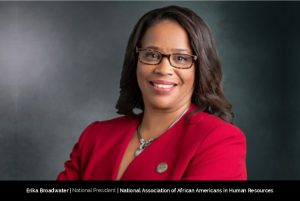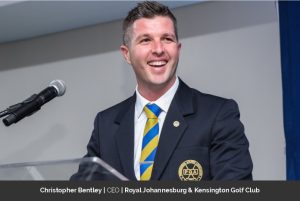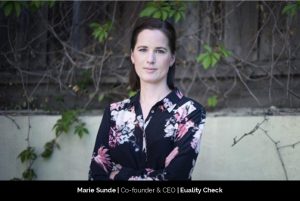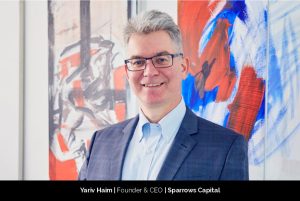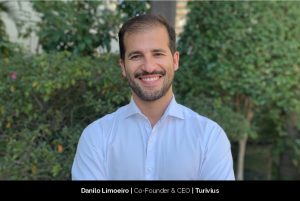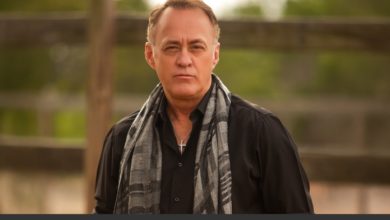Andrew Roach: Leading Norfolk Island Effectively to Make it the ‘Best Small Island in The World’
Top 10 Most Impactful People in Business, 2024
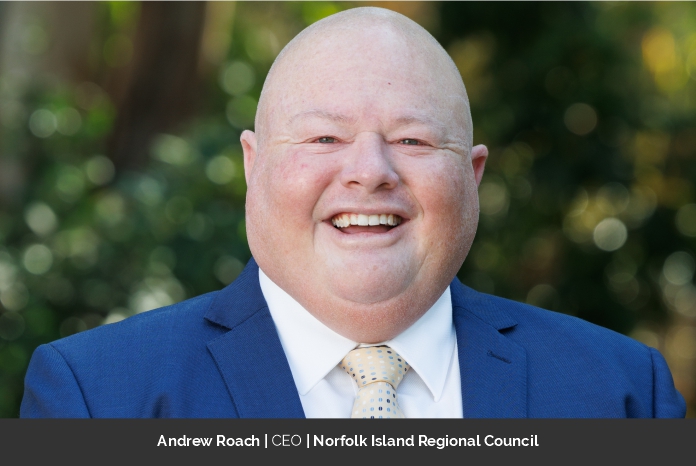
Andrew
Roach maintains that the five managers who form his team as CEO Norfolk Island
Regional Council (NIRC) have benefitted from his coaching and mentoring
approach. He defines their success as accomplishing the tasks that Council sets
them, which don’t always fall under the standard local government service
responsibilities.
Responsible
for the operation of NIRC and its varied business units, Andrew has also had to
negotiate his way through a Public Inquiry shortly after his appointment, which
resulted in the suspension and subsequent dismissal of the governing body of
the organization.
Along with
Mike Colreavy, who was appointed as Administrator of Norfolk Island Regional
Council, Andrew began the journey to bring the organization back from an almost
insolvent local government authority.
How NIRC is Fostering a Prosperous Economy
The goal of
Norfolk Island Regional Council (NIRC) is to provide local civic leadership and
governance through good decision-making, accountability, and transparency. It
protects and enhances the unique culture, heritage, traditions, and environment
of the Norfolk Island people by promoting a healthy and sustainable lifestyle,
looking after their community assets, and fostering a prosperous economy.
Norfolk
Island Regional Council embraces the following core values that were developed
in a workshop with the Councillors (I CARE):
· I – Integrity
· C – Communication
· A – Accountability
· R – Respect
· E – Excellence
Norfolk
Island Regional Council is responsible for all local council and some state
government functions on Norfolk Island including waste management, land rates,
and planning. The provision of a broad spectrum of services to the community
requires the Council to have a workforce that has a range of roles throughout
the organisation.
Some
positions within the regional council include customer service, finance, legal,
planning and development, telecommunications, human resources, electrical,
information technology, aviation and fire service, road works, waste
management, environment, and management/executive positions.
NIRC runs
electricity generation and distribution, all telecommunications services
(terrestrial and mobile), the international airport, radio station, and all
liquor imports and sales (monopoly). It also delivers some state-type functions
under an agreement with the Department of Infrastructure, Transport, Regional
Development, Communication, and the Arts, such as the Petty and Supreme Court,
car registrations, drivers and gun licensing, records management, births,
deaths, marriages, land titles, and other smaller state services.
Striving to Leave a Legacy of Success
Andrew’s
responsibilities include building teams and infrastructure, fixing the
finances, bringing new business to the community, and managing sporting and
community events, but he insists that all of these were achieved by bringing
the best out of his team at the right time. “I’m certainly a different leader
today than I was 20 years ago because the lessons on the job have made me the
leader I am today. Leaving a legacy of success, whatever the target, is what I
strive for when I take on any role,” he says.
Andrew
feels that his greatest achievement has always been improving the financial
strength of all the councils he’s worked at. Making this the priority gave him
the ability to extend beyond the core activities and build better communities.
These include the Central Tablelands Livestock Exchange, Blayney Sealink, the
Port Macquarie Glasshouse, and over the last few years, the Norfolk Island
International Airport, and the work towards 100 percent renewable energy.
Andrew has
also travelled the world playing bagpipes for over 30 years, a
passion in which his family is also involved, and which takes him away from work
challenges into an environment of lifelong friends and enjoyment. His team at
NIRC is motivated by the autonomy that he provides them, and they have all the
support they need in terms of training, resources, his time, and access to the
extensive networks he’s developed across Australia.
The Challenges of Living and Working on An
Island
Andrew
believes that challenges absolutely make one stronger, and admits that he’s had
his fair share across several council roles. He sees each challenge as a lesson
to perform better the next time. “I’ve certainly employed this tactic
throughout my career and see roadblocks as an opportunity to think differently
about what I can do to achieve the outcome I’ve set. Whether it’s staff, lack
of resources, convoluted legislative or regulative obstacles, there’s always a
way to find the best outcome,” he observes.
Andrew understands that living and working in a locality surrounded by
the sea comes with
its own set of challenges experienced by many other island communities
worldwide. Three of the greatest challenges on a small island in the middle of
the South Pacific are all about the 3 R’s: Roads, Rates, and Rubbish. The council’s
role in this challenge is to provide facilities and services to ensure that the
community can survive, and indeed thrive, both ethically and in a financially
responsible manner to the best of its ability.
Andrew
shares a quote from a famous Australian novel, “The Tyranny of Distance,”
written by Geoffrey Blainey in 1967, that describes how the “tyranny of
distance and isolation have long been a challenge, and indeed a major factor in
the shaping of Australia’s history and identity, and how the future continues
to be formed.” This aptly describes the challenges faced by Norfolk Island
Regional Council and its community.
Andrew
observes that the council and its workforce need to be highly versatile and
adept at managing a wide range of responsibilities that encompasses local,
state, and federal functions, reflecting their multifaceted capabilities. With
a small island economy and limited avenues of funding for infrastructure and
development in an island environment, the support and funding opportunities
provided to the Norfolk Island community from the Federal government have seen
significant developments and improvements that otherwise would not be possible.
The
development of a 10-year plan to ensure multi-year funding across several
platforms on the island was seen as a powerful resource to encourage
collaboration between all levels of government to develop a unified solution
for Norfolk Island. Where possible, NIRC involves the services and staff of
residents, whether as employees of the organization or contractors available in
the community, but occasionally does need to source external contractors from
the mainland to assist in the development of facilities and services.
However,
one of the biggest challenges has been to progress shipping solutions for
Norfolk Island. The Australian Government currently subsidises a barge service
from Brisbane to Norfolk Island during the peak tourism period. The Department
of Infrastructure provided approximately $800,000 in multi-level funding. In
collaboration with the Commonwealth Government Infrastructure team, NIRC
identified and purchased two new lighterage vessels to address the urgent need
for freight operations to continue under AMSA, ComCare, and general safety
standards.
Strengthening
Governance and Accountability
Under
Andrew’s leadership, NIRC has undergone a significant transition towards
sustainability, achieving several notable accomplishments:
· Construction and opening of a $48
million upgrade to the International Airport, including runway resealing,
safety improvements, lighting upgrades, and operational enhancements.
· Reconstruction of the Bicentennial
Building, establishment of a new community library, and general enhancements to
the civic precinct in Burnt Pine, totaling $3.5 million.
· Installation of new pathways from
the airport to school, equipped with solar lighting for nighttime safety, totalling
$1.5 million.
· Resealing 14% of the road network to
a bitumen finish, with an investment of $5 million.
· Upgrade of the mobile network from
2G to 4G, with a budget of $4 million.
· Transition to a renewable energy
network, including the installation of 880 new solar panels and 3 megawatts in
battery storage, resulting in a reduction of diesel generation by over
one-third in a year.
· Improvement of the organization’s financial
position, achieving three consecutive surplus budgets and accumulating over $5
million in unrestricted funds. The total cash and investments exceeded $25
million as of June 2023, compared to zero cash in December 2020, which required
a $3 million cash bailout from the Commonwealth.
· Strong fiscal management of
operational costs during the administration period, particularly in keeping
employment costs at $10 million for three consecutive years.
· Completion of 80% of the 117
external audit findings to enhance governance, with plans to address all
findings by June 30, 2024.
Andrew also
shares that a state-of-the-art asset management system has been developed to
meet the outcomes of the Public Inquiry that dismissed the Council.
Committed To Reaching 100 Percent Renewables By
2024
Andrew
laments that Australia’s current economic growth is being stifled and not being
given the opportunities other nations have. The country has enormous
opportunities to use its competitive advantage, its resources, its people, and
its large land mass, but fails to take advantage of things it can do well,
choosing easier options when it just requires commitment. While it’s abundant
in water, wind, and other resources, they’re not being properly harnessed.
“The money
the government wastes, if guided more meticulously, could be used to build
infrastructure to make this country dominant. I remember reading a report by
Senator Button about capturing the water that flowed out of the Clarence River
in NSW, or the Ord River in WA, which would solve our nation’s problems, just
like the Hoover Dam changed the Colorado River area. Politicians now make
decisions based on election cycles, not how life can change for our
communities. We’ve got it all wrong! We reward swinging seats when we should be
rewarding safe seats. This brings security for politicians to make real
decisions,” he observes.
Having said
that, NIRC remains committed to reaching its policy of 100 percent renewables
by 2024 and aims to reduce the current tariff regime by at least half, which
would benefit all households and businesses. In December 2020, it installed the
Tesla 2MW Battery, which supplies 4 to 6 hours of energy to the island per day
to increase this output.
The funding
was provided by the Department of Infrastructure, Transport, Regional
Development & Communications for Capital Expenditure support for additional
batteries and generation to hasten the renewable energy program. To procure
this funding for capital grants from the Department, the council allocated
$200K in its capital expenditure for asset improvements in the electricity
business unit.
Furthermore,
the organization sought an expression of interest to build a financial model
for staged improvements, to move towards its target of 100 percent renewable
energy sources by 2024, and has been engaging with 100 percent renewable energy
island companies – EPC Technologies, Greencap, and Energy Edge.
EPC
Technologies submitted a technical and commercial feasibility roadmap to
address the identified risks and place the operations of the Electricity
Business Unit on a sustainable footing. Part of this submission provides a
financial assessment to build a pathway for the introduction of multiple
tariffs, particularly feed-in tariffs, and a pathway to reduce the current fee,
set at $0.72 per kilowatt by at least half by 2024.
Supporting the Local Community with COVID
Assistance Grants
When the
COVID-19 outbreak and travel restrictions affected local Norfolk Island
businesses, the Australian Government and NIRC provided financial assistance
payments. This relief scheme supported local businesses that experienced
hardship caused by the downturn in visitors due to widespread COVID-19
lockdowns and travel restrictions across Australia. It is similar to other
programs that were delivered to COVID-19-affected communities in Australia.
Opening in August
2021, the COVID Business Relief Grant Program distributed $1,492,000 in funding
to 86 businesses on the Island. The purpose of the economic stimulus projects
rolled out during COVID was to keep people employed and ensure enduring
facilities for the community and visitors into the future. The resulting
facilities and upgrades are high quality and are being used and enjoyed by
locals and tourists alike, including the Lions Park playground and undercover barbeque
facilities.
Tony Cook,
owner of Pizazz, said, “The COVID Business Grant program was a welcomed
initiative from the Commonwealth government. The funding provided support to
many businesses on the island affected by the downturn in visitors as a result
of Australian border restrictions. Norfolk was fortunate to have a small number
of visitors from Queensland, however, this was not enough to sustain the many
businesses on the island. The grant funding allowed me to retain my staff at
the number of hours they were working before the downturn in visitors. Norfolk
Island is a small community, the grant funding ensured that businesses could continue
to employ staff and ultimately this money circulated quickly in the economy and
provided benefits to everyone.”
Rael Donde,
Proprietor of Cumberland Close and President of the Accommodation and Tourism
Association (ATA) said, “One of the good things about the grant was how it was
structured to provide four tiers of funding. As it was based on turnover, the
available funding differentiated between small, medium, and large businesses.
Businesses really appreciated the change in the qualifying dates, this made the
grant more accessible to local businesses, particularly those in the
accommodation sector.”
Over the
past year, 29 island residents benefited from a Council-funded Tertiary
Education Bursary developed in recognition of the fact that education and
training play a key role in building a strong and sustainable community and
empowering the future of younger generations. A total of $30,700 was granted in
scholarships to students undertaking nationally accredited university and
vocational studies (delivered by TAFE, Registered Training Organisations, or as
apprenticeships) on and off the island, to help cover study-related travel
costs and expenses. The program’s objective is to encourage young adults to
develop skills and improve employment prospects, and it is also open to adults
wishing to upskill or seek formal qualifications.
Making Norfolk the ‘Best Small Island in The
World’
NIRC’s ultimate
goal is to support Norfolk in becoming the ‘best small island in the world,’ providing
a quality tourism destination and
becoming an international drawcard, by making it a great place to live and work
for its residents. This means quality, efficiency, and cost-effective delivery
of services and infrastructure, and listening to the needs of the community.
Andrew
notes that this needs to be balanced with what NIRC can afford, so they can work
towards a long-term delivery plan to improve the future livability and
sustainability of the community. In addition to the above programs, NIRC was
involved in several initiatives listed below:
· NIRC increased transparency,
community trust, and funding by implementing the Envisio Strategic Planning
Software.
· The new public library was made
possible by Economic Stimulus funding received from the Commonwealth Government
and will enable the organization to increase the number and range of services
it can offer the community. Three public PCs were installed in the library to
allow the community and visitors access to free WIFI.
· With the help of Anne Prince
Consulting (APC), NIRC is updating its Waste Management Strategic Plan to
further improve its waste management practices such as large-scale composting,
steel, and car crushing, and segregation of recyclables from general waste.
Alternatives for domestic and commercial waste are being considered, including
circular economy approaches, incineration, and continuation of bailing and
export.
· Through the Virtual Fencing Pilot, made possible by the Marine Parks grant from Parks Australia, NIRC has been successful in securing funding for advanced technology to protect sensitive waterways from cattle and help improve water quality flowing into the Marine Park. The cost-effective technology utilises a system of individual cattle collars, GPS, and radio communication, along with software to adapt grazing patterns, and is increasingly used to manage cattle in place of physical fencing. It is hoped this system will bring benefits to marine waters, including coral reefs.





